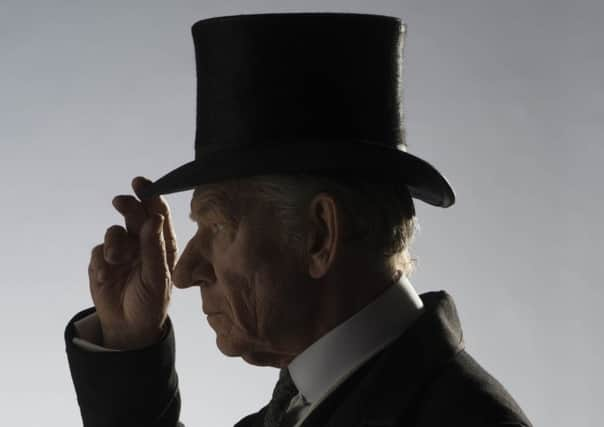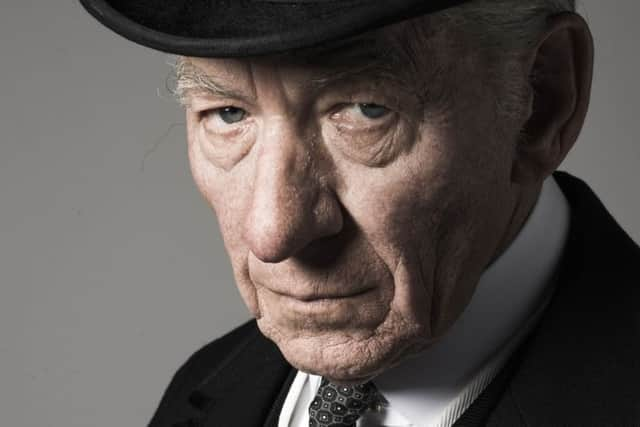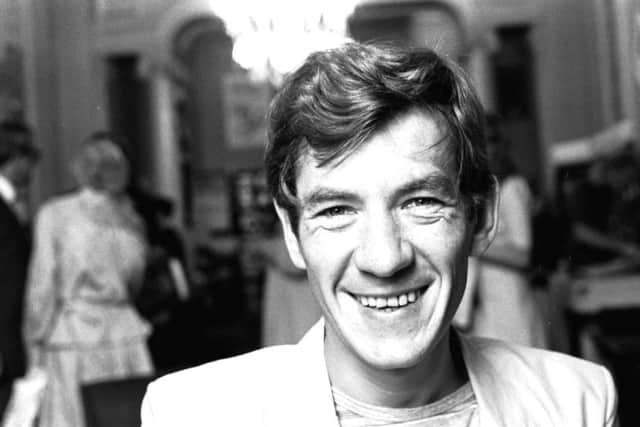Sir Ian McKellen on playing Sherlock in Mr Holmes


He’s got a lovely turn of phrase, Sir Ian McKellen. “Where are you stationed?” is his opening gambit. Edinburgh I tell him. “Have you come down just for me?” he asks, eyebrow raised, leg of his specs playing around his lips. Yes, I say, but no pressure. He emits a small laugh. “No. No pressure to be brilliant.” He pushes his hand through his unruly white hair. He doesn’t look worried.
McKellen is 76. Wearing skinny black jeans, black mock-Victorian style ankle boots, a blue shirt and a deconstructed herringbone jacket, he looks fabulous. Stylish. I might go so far as to say rather beautiful. His hair puffs around his head, backlit as he is from sitting on a bench seat that is the bottom sill of a square window overlooking the muddy brown Thames. We’re in East London. McKellen lives close by, has done for three decades or more. He owns a pub called The Grapes that’s local too, although that’s a more recent development.
Advertisement
Hide AdI find myself relieved to see McKellen looking so vibrant, so full of life, because in Mr Holmes, a rather delicate and lovely take on the later life of Arthur Conan Doyle’s literary creation, McKellen plays the 93-year-old detective, retired, in exile in a cottage on the south coast of England with almost alarming accuracy. As much a meditation on memory and mortality as sleuthing, he also plays Holmes in his 60s in flashbacks, a man at the peak of his powers, bestriding London in a top hat and tails (there is no deer stalker).


The film came to him, he says, “out of the blue” from Bill Condon who had directed him in Gods and Monsters, for which McKellen was Oscar nominated. Their past work had been a happy experience and they became friends. “So when he asked if I wanted to play Sherlock Holmes I said yes,” McKellen says. “It was fun for me to play older than I am and younger than I am.” That Laura Linney was also cast and filming would all take place in the UK (over the course of his decade or more as Gandalf in The Lord of the Rings franchise and Magneto in the X-Men movies, McKellen has spent his fair share of time away from home in both New Zealand and Los Angeles for filming). “It couldn’t have been more blissful really. I was surrounded by old friends – Roger Allam and Frankie de la Tour and Frankie Barbour. It was just like a big present, really. It wasn’t hard work at all.”
Based on Mitch Cullin’s 2005 novel, A Slight Trick of the Mind, the film hinges on Holmes’ struggle with the early stages of dementia. As his mind clouds, and death approaches, he tries to recall his last case. It’s his attempt to understand not just one case, but his whole life. It’s elegiac, poignant and moving. For McKellen, it was a reminder of an ever-present topic.
“I’m at an age when people die every week,” he says with a small shrug. “At my age. I was asking a friend the other day, how often do you think about death? And we agreed every day. I have a good think about it. Not just, oh, death.” He pauses for a long time and for a moment I feel a little worried that we have strayed into difficult territory. I needn’t have. “I wrote my requests for my memorial,” he says with a flourish, “where I want it held, in a theatre somewhere, and who I want on the bill and what they should do and at the end I thought, well, I’m sorry I’m going to miss this.” He laughs, twinkles really. “I should have a dress rehearsal before I die.”
Nobody tells you, he says, that when you get to 70 you will be surrounded by death. “A friend of mine was dying the other day and I went to say goodbye to him. He didn’t wake up. He just kept on snoring. So I said, ‘Rog, I’m going to have to go now’. He woke and squeezed my hand and then he said, ‘I’m going to have to go’.” McKellen reassured him that this was fine and asked him how he felt. His reply was that he didn’t want to miss anything. “And that’s what I feel like,” he says. “But then there are others dying at a later age and I think bring it on. On the whole, if you’re not struck down young, death comes as a release.”


It’s an interesting conundrum. McKellen is one of those actors who has become more famous as he’s aged, perhaps he’s not more in demand (he has been, of course, a revered stage actor for decades) but the projects are so much bigger now, we’ve all been treated to seeing that delightfully craggy face so much more often, in some of the biggest movies of recent years. For a man who thought he’d missed his chance of a movie career while his contemporaries of Albert Finney, Tom Courtenay and Peter O’Toole found theirs, it’s been quite the turnaround. In fact, he was 60, when he got his Hollywood break. And it’s not just in films that his career continues to burgeon. He’s just finished a film for TV of Ronald Harwood’s The Dresser, opposite Anthony Hopkins. He’s about to bring Pinter’s No Man’s Land to London with his old mucker, Patrick Stewart. And just in case you thought his film career was winding down (there will be no more Gandalf or Magneto) he’ll appear as a talking clock in the new live action Disney version of Beauty and the Beast.
Advertisement
Hide AdPerhaps it’s knowing all this that makes watching McKellen as a nonagenarian in Mr Holmes so arresting. He is stooped, infirm, his skin mottled with liver spots. His hair is thin and receding, the veins almost visible through his paper-thin skin. As the younger Holmes, his posture is perfect. Assisted by some rather beautiful tailoring, he strides rather than shuffles, darts rather than dawdles, but it is the older man who stays with you.
“Playing an old man is interesting but, at my age, it’s only a case of giving in,” he says. He lets himself slump down, curling his head forward over his chest. “You get yourself comfortable and then you stand up and this is how it is.” He does look instantly aged even in his skinny jeans. And then stands back up, poker straight, imposingly tall. “I do pilates,” he booms, “which is all about stretching and core and up, up, up. So when I was playing the younger one I put a spring in my step. But it was easier to play the old man than to play the younger.”
Advertisement
Hide AdHe is Gandalf and Magneto and now Holmes, but McKellen is a theatre actor at heart. It’s in his every move, his enunciation, his projection. And it’s in my perception of him too because the first time I saw McKellen was on stage at the King’s Theatre nearly 20 years ago. (Actually, I thought it was longer, but he reckons mid-90s). He was playing Richard III in Richard Eyre’s National Theatre version of the play. He was utterly mesmerising. My memory is that every time he was on stage the audience was completely quiet, pin drop silent, transfixed. But it’s not even the words I really remember, it’s McKellen standing spotlit in the centre of the stage, unsteady on his withered leg, his left arm limp, undressing and redressing while speaking directly to the audience.
McKellen smiles, remembering. “It was good, wasn’t it?” he says. “I used to do it every performance. I had the glove and I found by just doing that,” he wiggles his fingers ever so slightly, “amazingly it would just fall on to my hand. ‘Ooh, did you see that?’” he hams. “‘Come back tomorrow and I’ll do it again.’ It was a good wheeze that.”
The memory prompts others about performances in Scotland. He remembers doing Richard II and Edward II at the Assembly Hall, not least because a local councillor tried to have the latter stopped because, “he was revolted at the sight of two men kissing each other. At a time when, to be fair to him, it was illegal in Scotland to be gay. I was breaking the law every night with my boyfriend. Isn’t it amazing.” He giggles.
McKellen came out in 1988, when he was 49. He did it on Radio 3 when another guest on the panel debate in which he was participating kept talking about gay people as “them”. McKellen made it personal. He keeps it that way, speaking often about the importance of coming out, its role as a way in which “to join the human race”. Being open about his sexuality made him a better actor he says. His only regret is not having done it earlier. By the time he did, both of McKellen’s parents were already dead (his mother from breast cancer when he was just 12, his father, just after seeing his son’s West End debut, when he was 24). He still visits schools as an ambassador for Stonewall (McKellen was one of the founders). I can only imagine how amazing it is for the young gay people to witness Gandalf being so out and proud. “If you do meet indifference or aggression then they’re in the wrong,” he says. “That’s one thing I love about talking on gay issues,” he leans in to deliver a theatrical whisper, “I am absolutely right. I wouldn’t swear how to boil a kettle or an egg, you could have an argument about that. There is no argument about what I’m saying.”
In Mr Holmes, the elderly detective attempts to kick start his ailing brain by writing his cases. He can no longer summon up the details of his deductions so he tries to prompt his thought process by creating stories, just as Dr Watson had once done. McKellen will soon be attempting to do something similar. “In the last few months I’ve met some publishers and one of them has persuaded me to go with them so I am writing my memoirs,” he says. Then a flicker of worry crosses his face. “I’ve just been working with Anthony Hopkins. He would start telling a story and it’s as if he’s remembering in the moment when he was six or seven. He’d suddenly say, ‘and the sun came out…’ He can remember the weather? It was more than 70 years ago. I can’t do that.”
He’s not a person who spends much time looking back, he says. And many of the people who were around with him then are no longer here. “My sister’s dead and she would remember all sorts of things. We had some evacuees come to live with us during the war. Mrs Levick, with her two children. I think he was called Tony but I don’t know what she was called. I can’t even remember their names. They lived with us for a year. So I can’t make much of a story out of that.
Advertisement
Hide Ad“I’ve just had my cousin Margaret to stay. She’s roughly my age. We worked out we have known each other longer than anyone else in our lives. I always think of myself as having been a shy child, very shy. But she said, ‘you were such a show off’.” His eyes widen and he laughs.
What about the theatre? He was taken to the theatre when he was very young, I bet there’s little he’s forgotten about that.
Advertisement
Hide Ad“I can remember lots about that. My parents loved it and there was a lot of it about in those days. My town, Bolton, had three theatres in it. One with a repertory company doing a different play every week. One that was a sort of variety theatre which also took in tours of opera and ballet and did a pantomime and the other was resolutely variety, The Grand. I used to go backstage. Theatre was a big part of my life because it was part of their lives.
“When you say all that it all looks rather inevitable,” he says, of his career as an actor, “but my father played the piano and my sister played the piano and I begged to not continue with my lessons. My father was a rock climber. I like walking but I’ve never had a rope round my waist. There was a cricket pitch at the end of our street. My sister was potty for cricket. I’ve never played cricket in my life. So why was it the theatre? Nothing is inevitable.” He leans back, stretching himself, and turns to look out the window at the timeless Thames below. “I’ll look forward to trying to work that out.”
• Mr Holmes (PG) is in cinemas from Friday 19 June